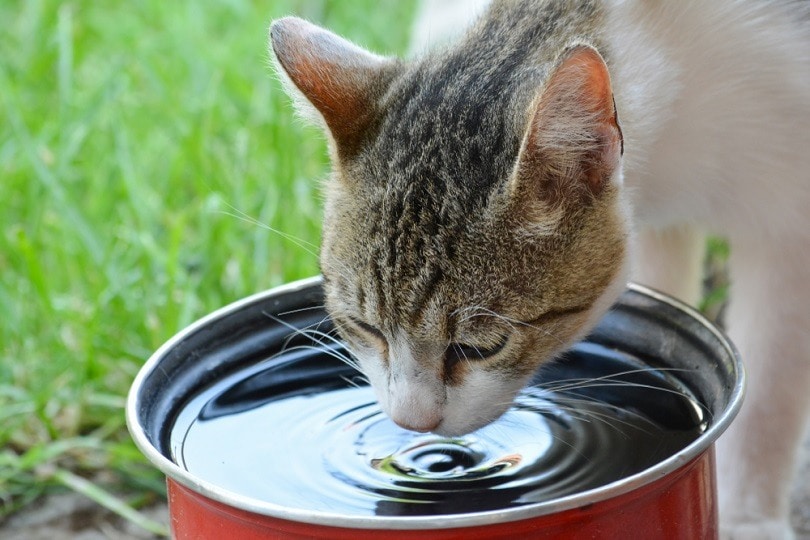
Cats are fascinating creatures that often have us wondering what they’ll do next. Sometimes their behavior can be a source of entertainment, but other times it can be a cause for concern for a cat parent. For instance, your cat may begin to cough after drinking water, and naturally, you’ll want to know why.
Fortunately, you have come to the right place. Cats will cough after drinking for a number of reasons, and the following article will address the most common ones. Some reasons are not concerning and can easily be remedied, but there are also causes that may require medical attention, which is why an appointment with your veterinarian is always the best solution. Here are the reasons your cat may be coughing after drinking water:
The 5 Reasons Why Your Cat Coughs After Drinking Water
1. Your Cat May be Drinking Too Quickly
Your cat may simply be drinking the water too quickly, which can result in coughing. It may also be the most probable reason, especially if your cat shows no other signs of discomfort or illness. When your cat drinks too fast, water can easily enter the windpipe by accident, which causes them to cough. Your cat may drink fast if they have just had a vigorous play session or are worn out and need to replenish and rehydrate. As long as your cat coughs out the fluids from their lungs, then there is no harm done, and there is no need to worry.
However, if your cat is gulping down water frequently, there could be something more serious that is causing them to be thirsty such as a urinary tract infection, kidney disease, high salt consumption, heat, and diabetes. Contacting your veterinarian is essential anytime your cat is drinking water excessively.
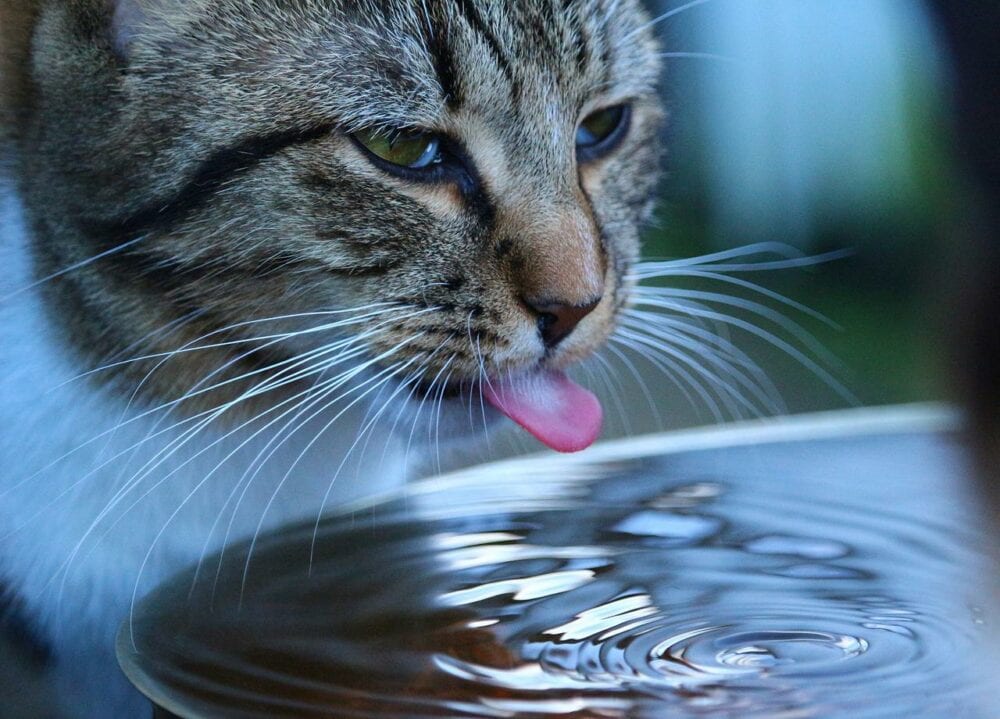
2. Your Cat’s Collar May be Too Tight
Another simple reason that can be rectified is that your cat’s collar may be too tight. If your cat’s collar is too tight, it can push down on the throat, which may cause discomfort when drinking water, and it can cause your cat to cough after taking a drink of water.
Assess your cat’s collar to determine if it is too tight. It shouldn’t be loose but also not restricting, and you can test this easily using your fingers. You should typically be able to fit two fingers underneath the collar, and if it’s too tight, loosen it slightly. Monitor your cat afterward when they drink to see if the coughing stops. If it doesn’t, you will need to consider other reasons your cat may be coughing.
3. Your Cat’s Water May Taste Bad
While water may be considered to be relatively flavorless, our cats can taste it when something is not right. It may be chemicals in the water, a dirty bowl, or something that may have gotten into your cat’s water bowl. You can follow these suggestions if your cat coughs after drinking water because it potentially tastes foul:

4. Your Cat May Have Swallowed a Small Object
Objects can fall into your cat’s water, like dust or debris, which your cat won’t notice and easily lap up while drinking. If your cat swallows something while drinking, they will cough to remove it. Your cat could also be battling a hairball or a large piece of food that wasn’t chewed properly.
You must monitor your cat and ensure the object was dislodged and not stuck. Contact your vet immediately if your cat doesn’t cough up the object. You may have to rush to the emergency clinic if your cat has trouble breathing from the obstruction.
Another relatively common problem in cats is blades of grass caught behind the soft palate. This usually presents with coughing, spluttering, and sneezing, which eating or drinking can trigger.
5. Your Cat May Have a Respiratory Infection
Feline Herpesvirus (FHV) and Feline Calicivirus (FCV) are the most prevalent feline viral respiratory diseases. Signs of these respiratory issues include an inflamed airway and throat, which can result in a cough when your cat drinks water, and the water makes contact with the swollen and inflamed passages.
However, if your cat has a respiratory issue, coughing will be a frequent occurrence, along with difficulty breathing, wheezing, sneezing, and watery eyes. If your cat shows any of these signs, contact your vet for a full examination.
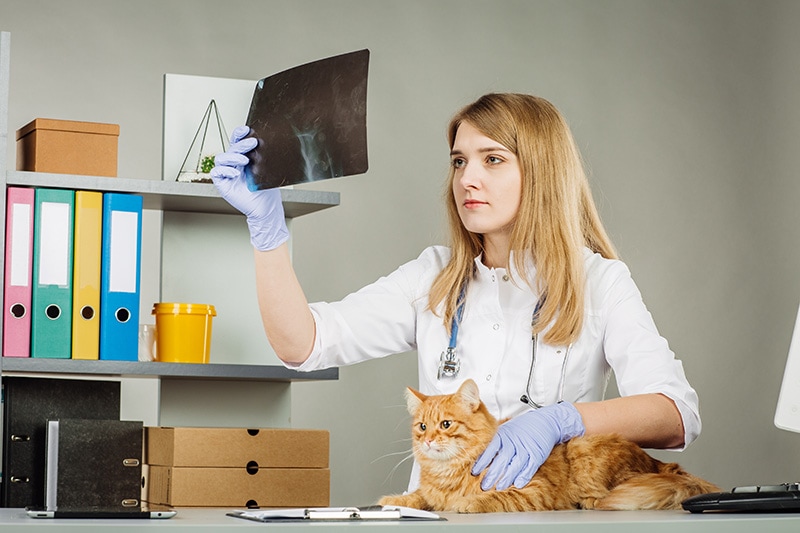
Allergies
If your cat has allergies, they may cough after consuming water. However, allergies lead to more general coughing, much like respiratory illnesses, and your cat will cough more frequently all the time, not just when they drink water. Allergies can be caused by food or environmental allergens such as dust mites, pollen, and fleas.
If your cat has allergies, you will also notice sneezing, wheezing, itchy skin and eyes, red and inflamed skin, and nasal discharge. If you notice any of these signs, it is possible that your cat may be allergic to something, and you should see your vet for a correct diagnosis.
Asthma
You might be surprised to learn that asthma is actually a relatively common condition in cats, more prevalent in the Siamese breed. Things like allergies or physical stimuli can trigger inflammation of the small airways in asthmatic cats, causing them to cough.
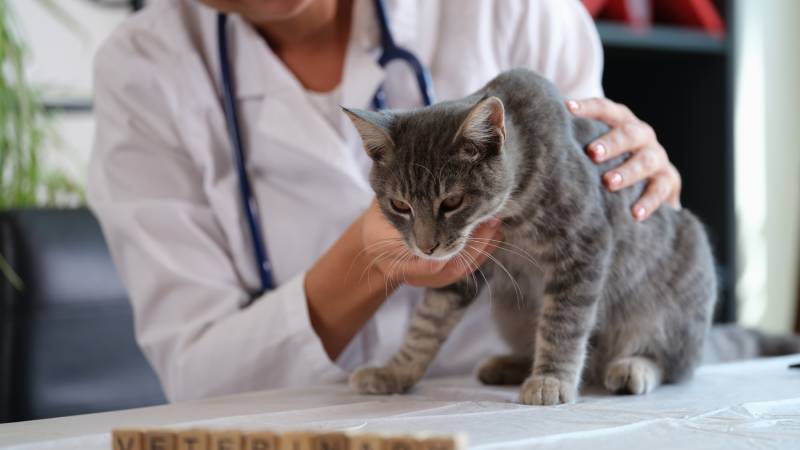
Dental Disease
A buildup of tartar, loose tooth, or inflamed gums are all things that could trigger a cough when your cat is drinking. Keeping an eye on your cat’s oral health might sound tricky, but if you get them used to this when they are young, it can be easy to have a look at their teeth and mouth.
Ensuring your cat has foods they need to chew is one of the most important and effective ways to maintain their dental health, but many cats will still need a dental visit at some point of their lives. Your vet can talk to you about your cat’s oral health and whether or not bad teeth could be causing an issue.
When Should I Worry About My Cat Coughing After Drinking Water?
If it was a one-off cough and splutter, or something that just happens once in a while, then it’s worth taking note of, but not something that needs any urgent attention. As mentioned above, sometimes just drinking too fast can cause a cough, just like with us. Just remember to check that their collar isn’t too tight.
If, however, the coughing after drinking becomes a regular occurrence, or if they are showing discomfort, like exaggerated swallowing or avoiding food and water, it is time to call the vet. If your cat seems to be having difficulty breathing after drinking, do not delay: get them to the vet immediately.
Also, if the coughing also occurs at other times, not just after drinking, it is definitely worth a trip to the vet.
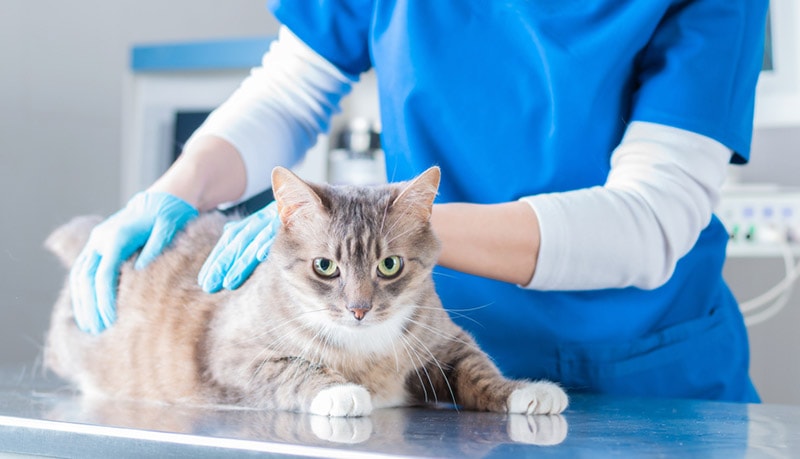
How to Prevent Your Cat from Coughing When Drinking Water
Now that you know what may potentially cause your cat to cough while drinking water, there are a few things you can do to prevent it, given that you have ruled out any health issues.
Conclusion
There are a few reasons your cat may cough when drinking water. For the most part, they are not serious and can easily be remedied. However, if your cat is coughing often, or not only when they drink, it may be a health issue that needs attention. Coughing is a natural reflex of the body to remove a physical contaminant or something that has an unpleasant taste.
Your cat could be drinking too fast, swallowing debris in the water, or their collar may be too tight. Ensure your cat’s water is always fresh and clean and don’t ever hesitate to call your veterinarian if you are in doubt about your cat’s health.
Featured Image Credit: AleksandarMilutinovic, Shutterstock








